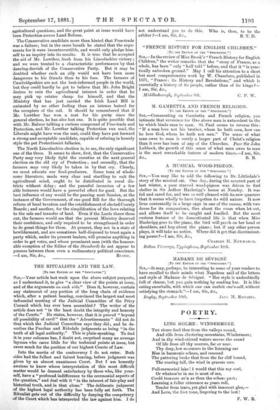THE ENGLISH BYE-ELECTIONS.
[TO THE EDITOR OF THE " SPECTATOR:1
STR,-It seems to me that in your issue of September 10th you lay too much stress upon the three English bye-elections that have lately taken place.
I was in North Durham on the polling-day, and conversed with a number of people who were interested in the contest.. They all agreed that agricultural politics had not the slightest influence on the result, and a perusal of the speeches of the candidates and their friends afforded ample confirma- tion of this view. The one subject that interested the constituency was coercion in Ireland. The utterances of the Liberal candidate on this subject were hesitating and half-hearted, whereas Sir G. Elliot spoke out boldly from the first in favour of the release of the suspects, and was lauded to the skies by Mr. Cowen's paper in consequence. It was at one time supposed that many moderate Conservatives. would be disgusted by the alliance between their candidate and the followers of Mr. Parnell, and that their defection would balance- the accession of Irish votes. But nothing of the kind appears to have happened. The party which hounded the Govern- ment on to coercion a few months back quietly voted for an. anti-coercionist in North Durham, while their candidates in. North Lincolnshire and Cambridgeshire were violently attack- ing the Ministry for undue leniency to Irish agitation. As if- determined to win at all hazards, Sir G. Elliot threw iii a few hazy promises about Fair Trade, to lure the puzzle-headed. electors, who believe that the remedy for a diminishing income- is to make dearer half the things it will have to buy ; and, so- as not to alienate the extreme Radical support he might win by his Irish policy, he promised to vote for household. suffrage in the counties. It must, of coarse, be held that all these promises fairly represent his political opinions, and if that be so, one may well question whether the North Durham election is the great Conservative triumph it is represented to-. be. At any rate, it has no bearing upon the agricultural situa- tion. Farmers' questions were hardly mentioned from one end of the contest to the other.
In Cambridgeshire, I was, to a certain extent, behind the scenes in the early stages of the contest ; and I can safely say that the blundering incapacity of the Liberal executive had a great deal to do with the miserable fiasco that followed. For reasons that it is not necessary to particularise, the Marquis of Blandford was exceedingly distasteful to the more serious- minded among the electors. It was a mistake to bring him out at all; but it was a still greater mistake to allow the contest to- begin without proper provision for its cost. With a good can, didate, prepared to fight the battle to the end, there was a fair chance of victory. The contest would have turned entirely-on
agricultural questions, and the great point at issue would have been Protection versus Land Reform.
The Conservative candidate more than hinted that Free-trade was a failure ; but in the same breath he stated that the argu- ments for it were incontrovertible, and would only pledge him- self to an inquiry into its results. It is true that he accepted the aid of Mr. Lowther, fresh from his Lincolnshire victory ; and we were treated to a characteristic performance by that dancing-dervish of the Conservative Party. But it may be doubted whether such an ally would not have been more dangerous to his friends than to his foes. The farmers of Cambridgeshire are not the best-informed people in the world, but they could hardly be got to believe that Mr. John Bright desires to ruin the agricultural interest in order that he may pick up estates cheap for himself, and that the Ministry that has just carried the Irish Land Bill is animated by no other feeling than an intense hatred for the occupiers of the soil. It should be remembered that if Mr. Lowther has won a seat for his party since the general election, he has also lost one. It is quite possible that with Mr. Bulwer talking a curious compound of Free-trade and Protection, and Mr. Lowther talking Protection run mad, the Liberals might have won the seat, could they have put forward a strong and acceptable candidate, capable of refuting in homely style the pet Protectionist fallacies.
The North Lincolnshire election is, to me, the only significant one of the three. It seems to show, first, that the Conservative Party may very likely fight the counties at the next general election on the old cry of Protection ; and secondly, that the farmers may very likely be taken in by that cry. Clearly, we must educate our food-producers. Some tons of whole- some literature, made very clear and startling to suit the agricultural mind, ought to be distributed in rural dis- tricts without delay ; and the peaceful incursion of a few able lecturers would have a powerful effect for good. But the best influence of any would be the passing next Session, at the instance of the Government, of one good Bill for the thorough reform of local taxation and the establishment of elected County Boards ; and another, for the simplification of the laws relating 'to the sale and transfer of land. Even if the Lords threw them out, the farmers would see that the present Ministry deserved their confidence, and only required to be strengthened in order to do great things for them. At present, they are in a state of bewilderment, and are sometimes half-disposed to trust again a party which, under its present leaders, will promise anything in order to get votes, and whose prominent men (with the honour- able exception of the Editor of the Standard) do not appear to possess between them even a rudimentary political conscience.































 Previous page
Previous page